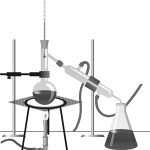Hot water seems to freeze faster than cold water, known as the Mpemba effect. The effect was named after the Tanzanian student who in 1963 noticed that hot ice cream mix freezes faster than a cold one. The effect was first observed by Aristotle in the 4th century BC, then later Francis Bacon and René Descartes.
Theories for the Mpemba effect have included: faster evaporation of hot water, therefore reducing the volume left to freeze; formation of a frost layer on cold water, insulating it; and different concentrations of solutes such as carbon dioxide, which is driven off when the water is heated. Unfortunately the effect doesn’t always appear, and cold water often freezes faster than hot water. Now a team of physicists from the Nanyang Technological University in Singapore have found evidence that it is the chemical bonds that hold water together that provide the effect.
Each water molecule is composed of one oxygen atom bonded covalently to two hydrogen molecules. The separate water molecules are also bound together by weaker forces generated by hydrogen bonds. These forces occur when a hydrogen atom from one molecule of water sits close to an oxygen atom from another.
The team now suggest it is these bonds that cause the Mpemba effect. They propose that when the water molecules are brought into close contact, a natural repulsion between the molecules causes the covalent bonds to stretch and store energy. When the liquid warms up, the hydrogen bonds stretch as the water gets less dense and the molecules move further apart.
The stretching in the hydrogen bonds allows the covalent bonds to relax and shrink somewhat, which causes them to give up their energy. The process of covalent bonds giving up their energy is essentially the same as cooling, and so warm water should in theory cool faster than cold.
I don't think this explains the guy who cooled himself to absolute zero, but I did read that he is 0K now.
